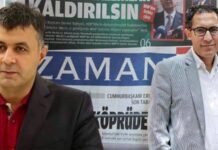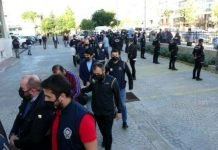As part of its massive witch-hunt, the Turkish government used its diplomats in Gabon to profile opponents of Turkish President Recep Tayyip Erdoğan and gather intelligence about them to help forge a criminal case against critics, Nordic Monitor reported.
According to a December 20, 2018 decision by prosecutor Adem Akıncı, the Ankara Chief Public Prosecutor’s Office launched a separate investigation (file no. 2018/28328) into four Turkish nationals who were listed in espionage files dispatched by Turkish diplomats in Libreville, the capital of Gabon, without any concrete evidence of wrongdoing.
According to the documents they were charged with “membership in a terrorist group” by Akıncı. The investigation was based on spying files created at Turkish diplomatic missions in Gabon between 2016 and 2018, resulting in serious consequences in the Turkish judicial system.
Prosecutor Akıncı, who led the investigation into the assassination of Russian Ambassador Andrei Karlov in December 2016, was accused of suppressing the evidence that the killer had links to various jihadist groups including al-Qaeda and was radicalized by several pro-government imams, including two who worked for the government religious authority, the Diyanet. Nordic Monitor previously reported that several suspects told the court that Akıncı had forced them to testify as if the assassination were directed by the Gülen movement. They were later jailed after declining the prosecutor’s request.
Profiling files might have been conveyed to the foreign ministry by Nurdan Bayraktar Golder, the Turkish ambassador to Gabon between 2015 and 2017, and Ambassador Fevzi Süphan Erkula between 2018 and 2019.
Judicial documents exposed how the spying activities of the Turkish Embassy in Gabon triggered criminal investigations in Turkey. (The names and addresses of the Turkish nationals have been redacted for security reasons):
As previously disclosed by Nordic Monitor, the foreign ministry sent lists of profiled Turkish nationals in two CDs to the Ankara Chief Public Prosecutor’s Office, the national police and Turkey’s intelligence agency MIT on February 19, 2018 via an official document for further administrative or legal action, the punishment of their relatives back in Turkey and the seizure of their assets.
The public prosecutor who received the foreign ministry document on February 23, 2018 forwarded the classified CDs including information on 4,386 Erdoğan critics to the organized crimes unit of the Ankara Police Department for further action. The police conveyed the results of its investigations to the public prosecutor.
According to judicial documents released by the Ankara 4th High Criminal Court on January 16, 2019, the foreign ministry compiled a long list of foreign entities that were owned and/or operated by people who were seen as close to the movement.
Turkish diplomatic missions continue systematic spying on Turkish government critics on foreign soil as confirmed by Foreign Minister Mevlüt Çavuşoğlu in February, 2020. Çavuşoğlu said Turkish diplomats assigned to embassies and consulates have officially been instructed by the government to conduct such activities abroad. “If you look at the definition of a diplomat, it is clear. … Intelligence gathering is the duty of diplomats,” Çavuşoğlu told Turkish journalists on February 16, 2020 following the Munich Security Conference, adding, “Intelligence gathering and information collection are a fact.”

















